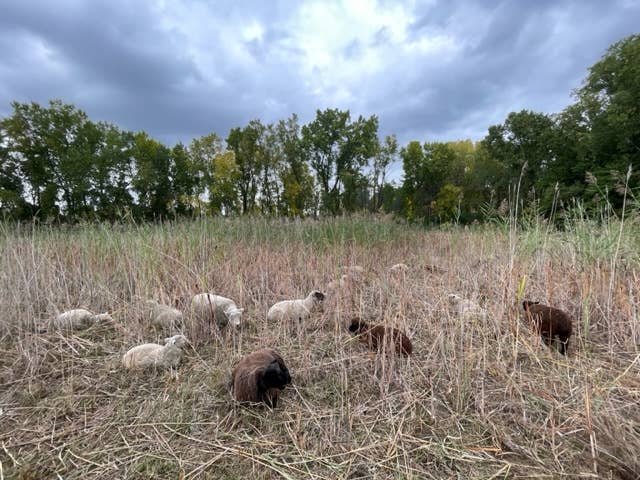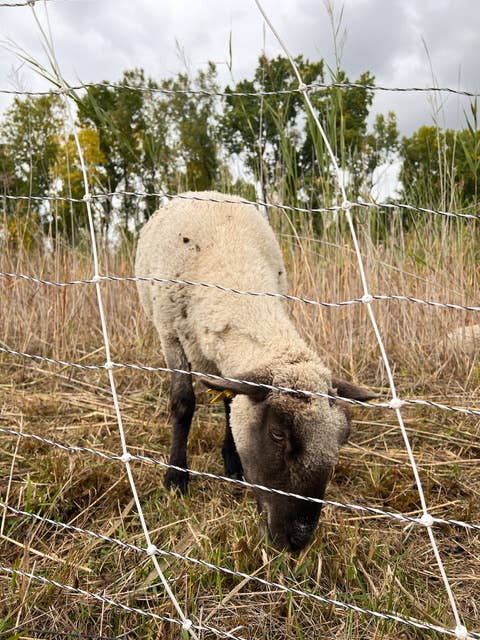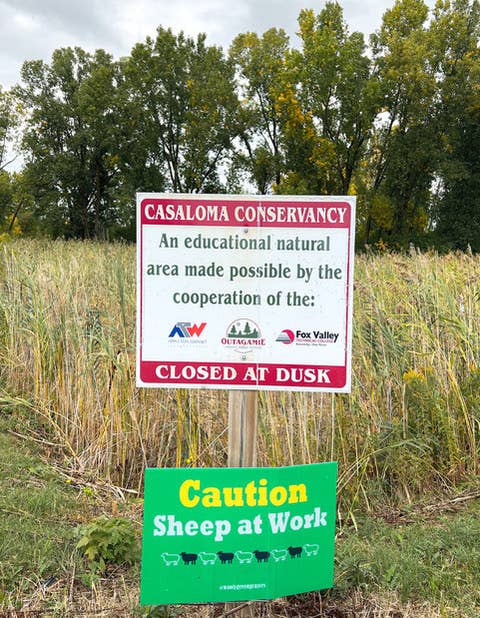Sheep Thrills at Appleton Airport
Wisconsin’s Appleton International Airport (KATW) has rented a herd of sheep for organic removal of an invasive plant.

[Courtesy of Schmidt Communicates/Appleton International Airport]
Phragmites Australis, also known as ditch weed, is an invasive species in Wisconsin. When it threatens to take over your land, you could spend thousands of dollars to hire a small army to rip the plants out by hand or spray herbicide that could create its own problems–or you could do what the folks at Appleton International Airport (KATW) and rent a herd of sheep for organic removal of the invasive plant which is growing in the Casaloma Conservancy area northeast of the airport.
According to airport officials, when an airport does any kind of development or expansion, it is required to replace developments with wetlands and conservancy areas where staffers manage invasive species. The airport purchased the property in 2011. It is a popular open space for hiking and getting back to nature as it has a short hiking trail.
It is a balancing act, notes Luke Bettis, landside operations supervisor for KATW, as they add plants to the conservancy then have to protect them from hostile weeds such as phragmites and buckthorn. “We spent about $2,500 on trees for the conservancy back in spring. If we use chemicals such as herbicides for the invasive species of plants, we could have killed or heavily damaged the trees.” Bettis also needed to find a cost effective way to manage onsite vegetation.
Bettis considered the idea of renting goats as gardeners. However, in addition to eating grass and non-native species the goats would also chow down on the newly planted trees, as goats are known for being non-discriminatory when it comes to feeding. They are also a high-spirited animal with no regard to fences or property lines, which could potentially create a new set of problems.
Bettis continued to look for options, and a social media post led him to Wooly Green Grazers, a sheep-based organic brush removal service located a few miles away. The sheep have a more discriminating palate, says Roxie Emunson, who owns Wooly Green Grazers with her husband Daniel. It is a new business for them—he recently retired from the U.S. Marine Corps. She grew up in Oklahoma and raised sheep in 4-H.
"Finally in 2020, with it being his last duty station, we bought our first two ewes and started. By the time we were ready to move to Wisconsin, we had four ewes and three rams."
Before the sheep could be deployed, the Emunsons make sure there is no milkweed in the area as that is toxic for sheep. Once that threat was mitigated, the sheep were deployed. For the better part of a month, the flock, consisting of Old English Southdown and a few crossbreeds, bivouacked and chowed down on the approved conservancy vegetation. They selflessly consumed hostile phragmites, buckthorn, and blades of grass, 24/7 . They were kept contained—and people and predators kept out—by electric fences.
"These are smaller sheep breed, not those big ones. They are sometimes called babydolls and no larger than 26 inches tall. They are petite sheep," Emunson explained. The portable sheep pen was moved weekly, and there were signs up to warn people not to disturb the sheep because they were working.
Remote surveillance in the form of a trail camera was also set up. "There was one particular sheep that kept coming in for a close-up. We named her Farrah. She liked to be on camera," Emunson says.
Wisconsin has been experiencing a drought of late, and that proved beneficial since the land in question is considered wetland, but it was dry enough that the sheep did not have any traction issues as they accomplished their munching mission.


According to Bettis, the cost for sheep transport and setting up the fence was approximately $1,500, about $1,000 less than traditional methods—and best of all the newly-planted trees were kept safe.
There is talk about bringing the sheep back for future missions.
“It's good for the environment, and it’s good for our souls because it’s almost therapeutic to watch them,” Emunson said. “My husband likes to say that we like raising and grazing!”
You can find Wooly Green Grazers on Facebook.

Subscribe to Our Newsletter
Get the latest FLYING stories delivered directly to your inbox






